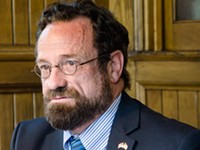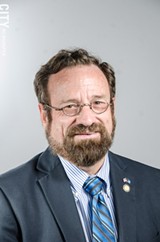[
{
"name": "500x250 Ad",
"insertPoint": "5",
"component": "15667920",
"parentWrapperClass": "",
"requiredCountToDisplay": "1"
}
]
Donald Trump was no stranger to the LGBTQ community prior to his presidential campaign. And during the campaign, he addressed the community directly.
"As your president, I will do everything in my power to protect LGBTQ citizens," Trump said at the National Republican Convention in July 2016. And a month earlier, he tweeted: "Thank you to the LGBT community. I will fight for you while Hillary will bring in more people that will threaten your freedoms."
So what happened to that Donald Trump? It's hard to know whether he meant what he said at the time or that was campaign rhetoric aimed at anti-Hillary Democrats.
Trump himself was a Democrat for many years, but he has also referred to himself as a traditionalist when it comes to marriage. He may have had more in common with conservatives – including opposition to LGBTQ rights – than anyone realized.
As the country celebrates Pride month and Rochester prepares to celebrate ROC Pride 2018, July 14 to July 21, it may be a good time for the LGBTQ community to access where the movement is and strengthen its resolve. Because one thing is clear: many of the gains made in the last decade are under attack by the Trump administration.
"Donald Trump said he would be an ally to the LGBT community, but he has completely abandoned the rights of LGBT people," says Omar Gonzalez-Pagan, senior attorney and health-care strategist for Lambda Legal. "He's actually done everything possible to reverse and attack the rights of LGBT people."
Two of the top people in the Trump administration have a history of anti-gay actions.
As governor of Indiana, Vice President Mike Pence pushed through the Religious Freedom Restoration Act, causing a national backlash and costing the state millions in lost revenue. As a member of Congress, Pence voted against strengthening hate-crime bills and against repealing the military's policy of "Don't Ask-Don't Tell."
As attorney general of Alabama in the 1990's, Jeff Sessions represented the state in a court case involving the Alabama's attempt to deny funding to student organizations that advocated for LGBT rights. As senator, Sessions voted against adding sexual orientation to the definition of hate crimes and he voted in favor of the Marriage Protection Act. Soon after becoming US attorney general, Sessions began issuing memos that either overturned or weakened protections set in place by Obama. Among them: permitting faith-based organizations with federally funded grants and contracts to be selective about the services they provide, based on religious freedom.
There have been many policy changes in the short time Trump has been in office that have gone against LGBTQ rights and protections, says Diana Flynn, litigation director for Lambda Legal. Some are more high profile than others, such as Trump's decision to reinstate a ban on transgender people serving openly in the military. Several related cases are tied up in multiple courts.
But Flynn says the one that bothers her most is the decision by Attorney General Jeff Sessions, no friend of civil rights laws, that transgender people are not protected by laws that ban workplace discrimination based on sex. The decision essentially wipes away the Obama administration's interpretation of Title VII of the Civil Rights Act, Flynn says, which leaves some of society's most vulnerable people without protection.
The Trump administration is essentially reshaping the justice system through the nomination and confirmation of ultra-conservative judges, says Gonzales-Pagan.
Nearly one-third of Trump's judicial nominees have anti-LGBTQ records.
"These are people who would never be confirmable under Reagan or Bush," he says. "Their opposition to civil rights, racial equity, and LGBT rights is a prerequisite to be on the federal bench."
Neil Gorsuch, Trump's appointee to the Supreme Court, made his anti-LGBTQ-rights position known early on. Shortly after joining the court, he wrote the minority dissent to the court's decision requiring states to include same-sex parents on birth certificates.
What's happening in the courts is especially alarming to Bess Watts. Both Watts and her wife Anne Tischer are longtime Rochester area LGBTQ activists. The recent Supreme Court case favoring the Colorado baker who refused to create a wedding cake for a same-sex couple was disturbing on many levels, Watts says. The Trump administration sided with the baker.
"What good is having marriage equality," says Watts, "if you can go into a store and be refused service? What if I get hit by a car and the doctor in the hospital says he refuses to provide care? Until we are a protected class, I don't think we'll be fully protected."
Some people say that the couple could have gone to another vendor who wanted their business, but they're missing the point, Watts says.
"That's like saying if Woolworths won't serve you, then go to another counter," Watts says. "This isn't just about LGBTQ rights. It's about civil rights."
We've seen a fairly consistent push-back from Trump, says Rowan Collins, communications director for Out Alliance, formerly the Gay Alliance of the Genesee Valley. "We're seeing an erosion of LGBTQ rights, and for many of us, it's something that we haven't really seen before."
Many people in the LGBTQ community, particularly younger people, became accustomed to seeing significant advancements during the Obama era, Collins says. However, a big problem for the community is that many of Obama's executive decisions protecting LGBTQ people were never codified into law, which makes the reversals easier for Trump and his allies.
Trump reinstated the ban on transgender people serving openly in the military.
He rescinded the Obama-era rules for K-12 schools allowing transgender students to use bathrooms and locker rooms that align with their gender identity.
Overturning even some of the most important legal milestones, such as marriage equality, isn't farfetched, Collins says. Collins and many LGBTQ advocates worry that Trump may be able to appoint another Supreme Court justice like the staunchly anti-LGBTQ conservative Neil Gorsuch. If that happens, the Supreme Court's decision on marriage equality could be reversed, Collins says.
Much of the pushback Collins sees from Trump's supporters goes beyond a rejection of gay or lesbian sexual orientation. That's particularly true of the evangelical right he says.
"I think so much of the fear comes from the play on gender, pushing the boundaries of what's acceptable as gender behavior," Collins says. "This is the way to behave. This is what women do. And this is what men do."
Trump's explanation for his transgender ban in the military was the high cost of health care for transgender people, something that shouldn't be the military's responsibility, he said at the time. But the cost of medical care for transgender service members is minuscule, not even near 1 percent of the Pentagon's budget, Collins says.
Trump's reasoning is more likely to be tied to the religious conservative view that gender is not fluid, and that gender expression, like sexual orientation, is a lifestyle choice, Collins says.
"What a narrow view of the LGBTQ community, especially the transgender community," Collins says. "It relies on old assumptions of what people are going to look like, be like, and what kind of work they can do. That's really dangerous."
State Assembly member Harry Bronson says Trump has a particular view of what masculinity means that's reflected in his treatment of women and his constant references to other men as strong or weak.
"If you come to this with a certain perspective of masculinity, then gender-expansive ideas or that we have same-sex couples, all of this is a threat to you," Bronson says.
In trying to eviscerate President Obama's legacy, Trump has resorted to autocratic tactics that are taking the country backward, Bronson says. "If you're different, then you're the other," Bronson says.
Authoritarian regimes have historically relied on marginalizing and sometimes targeting certain groups of people, he says.
"It's an us-versus-them way of thinking," he says.
Bronson himself has a pink triangle on his car, as a reminder that Nazis forced gay men to wear an inverted pink triangle in concentration camps as a badge of shame.
"Certain groups were attacked, and it was acceptable," Bronson says. "I never expected, never had a hint of belief that this America is possible."
The attack on LGBTQ rights isn't coming solely from the Trump administration. It was a problem at the state level before Trump was elected, and it is continuing.
Last year, several states – including Kentucky, Michigan, Missouri, Oklahoma, and South Carolina – had bills contesting marriage equality. And at least three states had bills that would prevent LGBT individuals or couples from adopting children.
Bias isn't limited to red states. Bronson points to the GENDA, the Gender Expression Non-Discrimination Act which would include gender identity and expression as a protected class under New York State's hate crimes law. And it would protect against discrimination in housing, employment, and public accommodations.
GENDA has passed in the state Assembly eight times. But, says Bronson: "It's never even come to the floor in the Republican-held Senate. There's no support for it."
Local Senate Republicans Joe Robach and Rich Funke have shown no interest in it, Bronson says.
"We have a ban on conversion therapy that the Senate won't approve, either," Bronson says. The American Psychiatric Association describes conversion therapy as unethical. But with Trump in the White House, there's little chance that state leaders on the right will support the legislation out of fear of retaliation, he says.
One minor victory: for the first time, Monroe County officials will display a Pride flag on the County Office Building during ROC Pride week.
Both Out Alliance's Collins and Bronson say that the LGBTQ community needs to recognize the importance of intersectionality. The LGBTQ community is wide and diverse, and it intersects with many different communities that share many of the same concerns about Trump: people of color, Muslims, immigrants, women, educators, and health care workers.
"We aren't just talking about protecting LGBTQ rights," Collins says. "We have to talk about racism. We have to talk about Islamophobia. We have to talk about anti-immigration. We have to talk about poverty and disability rights."
Speaking of...
-

Bronson releases RCSD improvement bill
Jun 13, 2019 -

Feedback 8/29
Aug 29, 2018 -

The Pride Divide
Aug 15, 2018 - More »
Latest in News
More by Tim Louis Macaluso
-

RCSD financial crisis builds
Sep 23, 2019 -

RCSD facing spending concerns
Sep 20, 2019 -

Education forum tomorrow night for downtown residents
Sep 17, 2019 - More »






